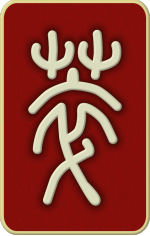
萃 Cuì Bringing together (Gathering) [hexagram 45]


Lake over Earth
 Metal element
Metal element
Lunar month: 8 ; Host (controlling) line : 5
The Decision
The leader approaches the temple. It is rewarding to meet a great person. Perseverance is favorable. Generous offerings will be honored by good fortune; worthwhile to start a new undertaking.
Bringing together – joyful obedience giving satisfaction. The strong is in the middle and resonates hence bringing together. ‘The leader approaches the temple’ – presenting offerings dutifully. ‘Rewarding to meet a great person’ – coming together is correct. ‘Generous offerings will be honored by good fortune; worthwhile to start a new undertaking’ – all in accordance with Heaven’s will. Studying how things are brought together shows how heaven, earth and all things follow their nature.
萃: 亨. 王假有庙, 利见大人, 亨, 利贞. 用大牲吉, 利有攸往. Cuì: hēng. wáng jiǎ yǒu miào, lì jiàn dà ren, hēng, lì zhēn. yòng dà shēng jí, lì yǒu yōu wǎng.
彖传: 萃, 聚也; 顺以说, 刚中而应, 故聚也. 王假有庙, 致孝享也. 利见大人亨, 聚以正也. 用大牲吉, 利有攸往, 顺天命也. 观其所聚, 而天地万物之情可见矣. Tuàn zhuàn: Cuì, jù yě; shùn yǐ shuō, gāng zhōng ér yīng, gù jù yě. wáng jiǎ yǒu miào, zhì xiào xiǎng yě. lì jiàn dà ren hēng, jù yǐ zhèng yě. yòng dà shēng jí, lì yǒu yōu wǎng, shùn tiān mìng yě. guān qí suǒ jù, ér tiān dì wàn wù zhī qíng kě jiàn yǐ.
The Image
Marsh over Earth form ‘Bringing together’. The wise accordingly keep weapons in good condition in readiness for the unexpected.
象传: 泽上于地, 萃; 君子以除戎器, 戒不虞. Xiàng zhuàn: Zé shàng yú dì, cuì; jūn zǐ yǐ chú róng qì, jiè bù yú.
Line Change 1
Sincerely desiring a get-together which proves impossible; this leads to confusion. A cry for helps quickly turns to laughter. Ignore the temporary concerns as going forward there is no error.
‘This leads to confusion’ – the future direction is unclear.
初六: 有孚不终, 乃乱乃萃, 若号一握为笑, 勿恤, 往无咎. Chū liù: yǒu fú bù zhōng, nǎi luàn nǎi cuì, ruò hào yī wò wéi xiào, wù xù, wǎng wú jiù.
象传: 乃乱乃萃, 其志乱也. Xiàng zhuàn: Nǎi luànnǎi cuì, qí zhì luàn yě.
Line Change 2
Drawn together – there is good fortune and no error. With sincerity the modest sacrifice will be accepted.
‘Drawn together – there is good fortune and no error’ – the middle place remains unchanged.
六二: 引吉, 无咎, 孚乃利用禴. Liù èr: yǐn jí, wú jiù, fú nǎi lì yòng yuè.
象传: 引吉无咎, 中未变也. Xiàng zhuàn: Yǐn jí wú jiù, zhōng wèi biàn yě.
Line Change 3
Striving towards union and seeming to sigh – nothing is advantageous. To continue onward is not in error but a cause for mild regret.
‘To continue onward is not in error’ – there is humility from on high.
六三: 萃如, 嗟如, 无攸利, 往无咎, 小吝. Liù sān: cuì rú, jiē rú, wú yōu lì, wǎng wú jiù, xiǎo lìn.
象传: 往无咎, 上巽也. Xiàng zhuàn: Wǎng wú jiù, shàng xùn yě.
Line Change 4
Full of promise, there is no blame.
‘Full of promise’ – even though the current position is inappropriate.
九四: 大吉, 无咎. Jiǔ sì: dà jí, wú jiù.
象传: 大吉无咎, 位不当也. Xiàng zhuàn: Dà jí wú jiù, wèi bù dàng yě.
Line Change 5
Brought together with dignity. No fault. If others lack trust, then persist with the correct attitude. All regrets will disappear.
‘Brought together with dignity’ – the clever plan has not been revealed.
九五: 萃有位, 无咎. 匪孚, 元永贞, 悔亡. Jiǔ wǔ: cuì yǒu wèi, wú jiù. fěi fú, yuán yǒng zhēn, huǐ wáng.
象传: 萃有位, 志未光也. Xiàng zhuàn: Cuì yǒu wèi, zhì wèi guāng yě.
Line Change 6
Sighing amidst bitter tears but no blame.
‘Sighing amidst bitter tears’ – lacking security at the top.
上六: 赍咨涕洟, 无咎. Shàng liù: jī zī tì tì, wú jiù.
象传: 赍咨涕洟, 未安上也. Xiàng zhuàn: Jī zī tì tì, wèi ān shàng yě.
The full set of 64 English translations is available in our new book 'Book of Changes - Deciphered' ➚.